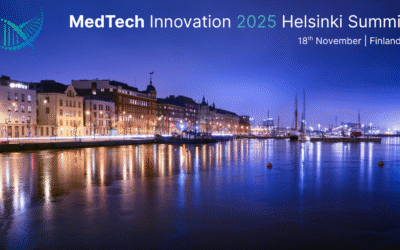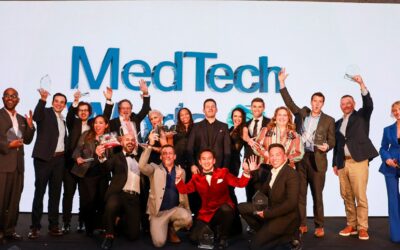A Gateway to Global Impact
The MedTech Innovation 2025 Helsinki Summit, presented by inXso, is a premier one-day event designed to accelerate European medical technology from scientific breakthrough to global patient impact. The summit serves as a crucial gathering point, uniting Europe’s most promising health and medtech innovators with strategic investors and critical market access experts. This event highlights a key partnership in Europe’s health innovation ecosystem: the EU Business Hub.
As a partner for the summit, Eurochambres underscores a commitment to fostering an environment where European innovation can thrive on the global stage. Attendees of the summit will have a direct opportunity to engage with inXso’s experts at the “Insights Corner,” where they can learn more about the EU Business Hub program and gain guidance on how to enter the high-growth markets of Japan and South Korea. This strategic presence at the Helsinki Summit positions the EU Business Hub as a practical, hands-on tool for European innovators seeking to bridge the gap from scientific breakthrough to international market success.
A Strategic Partnership for European Healthcare Internationalisation
The EU Business Hub is a program funded by the European Union with a clear, strategic mandate that bolsters the international presence of European Small and Medium-sized Enterprises (SMEs) and startups in the high-growth markets of Japan and the Republic of Korea. The program’s core objective is to boost the visibility of EU companies and strengthen their export and investment activities in these dynamic Asian markets. This is accomplished through a multi-faceted approach that goes beyond traditional trade promotion.
The program’s detailed objectives include four key pillars: trade facilitation, tailored support for SMEs, enhanced market insights, and the promotion of the EU brand. By focusing on trade facilitation, the program aims to align business cooperation with the objectives of existing trade agreements, such as the EU-Japan Economic Partnership Agreement and the EU-RoK Free Trade Agreement. The tailored assistance provided to approximately 50 selected companies per business mission is designed to forge strategic business connections through targeted B2B matchmaking.
The program also seeks to empower participants with in-depth knowledge of local business culture, market regulations, and industry-specific information, thereby increasing their competitiveness. Lastly, it is mandated to elevate the visibility of European businesses and to promote EU standards and brand reputation in the target countries. With the ambitious goal of organising 20 business missions—10 in each country—by 2027, the program is poised to support nearly 1,000 EU companies in their international growth endeavours.
The implementation of the EU Business Hub is a testament to the power of a strategic public-private partnership. The program is led by Eurochambres, the Association of European Chambers of Commerce and Industry, a major voice for the European business community.
Representing over 20 million businesses across Europe, with more than 93% being SMEs, Eurochambres provides the legitimacy, scale, and expansive network necessary to effectively implement a program of this magnitude. Complementing Eurochambres’ broad mandate is inXso, a specialised innovation agency that focuses on breakthrough, disruptive, and emerging technologies within the healthcare sector. With a core mission to “bridge the gap from innovation to impact,” inXso offers specific expertise in areas such as co-innovation, international business development, and innovation procurement support. This collaboration model is specifically designed to combine a broad, robust organisational infrastructure with a highly focused, sector-specific knowledge base.
A Proven Model for Market Entry
The EU Business Hub’s mission model is a meticulously structured process designed to maximise the potential for successful market entry while minimising the risk and cost for participating SMEs. The program is divided into distinct phases, beginning well before the mission week. In the pre-mission phase, selected companies receive “systematic business coaching” and “pre-departure briefings” to prepare them for market entry. This includes equipping them with in-depth knowledge of local business culture, market regulations, and industry-specific insights.
The mission week itself is a five-day, intensive itinerary. The agenda for the Healthcare and Medical Equipment Korea 2025 mission, for example, included dedicated days for industry intelligence briefings, study tours, and multiple business matchmaking sessions.
During the mission, participants have the opportunity to showcase their products at a dedicated exhibition space, attend networking events, and engage in pre-arranged meetings with potential local partners. A key feature is the inclusion of visits to major local trade fairs, such as KIMES 2025, which allows companies to connect with an even broader network of relevant stakeholders.
The program also provides significant financial and logistical support, including co-financing 80% of accommodation costs and customised services up to €1,000 per company. This comprehensive support system makes market exploration a more cost-effective and efficient undertaking.
A clear measure of the program’s effectiveness can be found in the outcomes of the Healthcare and Medical Equipment Korea 2025 business mission. This mission provided a targeted opportunity for 39 European SMEs and startups to kick-start their internationalisation path in the Korean market.
The results from this mission show that the EU Business Hub is a highly efficient and de-risked model for market entry. The high volume of pre-arranged meetings proves that the program’s value proposition of “targeted business matchmaking” is not just a claim but a quantifiable reality. The inclusion of study tours to local industry leaders demonstrates a commitment to providing a deep, practical market immersion. This goes beyond simple sales opportunities to fostering a strategic understanding of the market, aligning with inXso’s focus on R&D and international commercialisation.
Analysis of Japan and South Korea
The selection of Japan and the Republic of Korea as target markets for the EU Business Hub is a strategic response to a shared demographic megatrend: the accelerating ageing of East Asia. This trend creates a specific and predictable demand for technology-driven healthcare solutions, making both nations ripe with opportunity for European innovators.
The Digital Health Powerhouse of South Korea
The Republic of Korea is rapidly transitioning to a “super-aged society,” a demographic milestone it is projected to reach in 2025, when over 20.6% of its population will be 65 or older. This demographic shift is leading to a rapid rise in medical expenses for senior citizens, who accounted for 43.4% of total medical costs in 2020. This creates a significant socioeconomic burden that technology is uniquely positioned to alleviate.
The market for digital health in South Korea is experiencing explosive growth, with a projected compound annual growth rate (CAGR) of 23.2% from 2025 to 2030, which is expected to swell the market to a projected revenue of US$11.36 billion. The market’s dynamism is evident in key segments, including Tele-healthcare, which was the largest and fastest-growing segment in 2024, and Electronic Health Records, which contributed the highest revenue in 2023.
Government policies are a major catalyst for this growth. The South Korean government has established official “Strategies for Creating Bio-Health and Digital Healthcare Markets” and is actively advancing “Data-Driven and AI-Based Healthcare Technologies”. The country’s high level of technological readiness is a key factor, with South Korea ranking 10th worldwide for healthcare digitisation and having a remarkably high smartphone penetration rate, even among its older population.
These converging factors—demographic necessity and proactive government support—create a highly attractive environment for European digital health companies.
The Mature and Evolving Medtech Frontier in Japan
Japan, home to the world’s oldest population, presents a similar but distinct set of opportunities and challenges for European businesses. The country’s medical device market is one of the world’s largest, valued at US$40 billion in 2021. It is also a market that remains heavily dependent on imports, particularly for sophisticated medical devices. This reliance on foreign innovation, coupled with the rising prevalence of chronic and lifestyle diseases, ensures a sustained demand for advanced medical technologies.
The digital health market in Japan is also on a solid growth trajectory, projected to reach a market volume of US$12.65 billion by 2029 with a CAGR of 8.82% from 2024 to 2029. Specific areas of opportunity include minimally invasive medical devices, AI and Internet of Things (IoT) technologies for diagnostics, and healthtech solutions for areas such as sleep, beauty, and sports.
Government initiatives are a significant driver, with the “Basic Policies for Economic and Fiscal Management and Reform 2022” promoting the use of Personal Health Records (PHR) and the permanent legalisation of online medical services. The Japanese government is also working to standardise electronic medical records (EMRs) and has launched a fund to support drug discovery startups.
The markets of both South Korea and Japan exhibit a confluence of demographic necessity (the ageing population creating demand) and policy encouragement (government initiatives actively supporting digitalisation). However, a significant challenge remains in Japan, where a cultural bias towards face-to-face consultation persists, and the rate of digital technology usage in health management (37%) remains significantly lower than the global average (60%). This indicates a critical market entry barrier for foreign companies.
The EU Business Hub’s provision of “cultural and linguistic support” and “briefings on doing business in Korea” is therefore not a mere courtesy but a direct, necessary solution to navigate these specific, non-obvious cultural and market challenges.
Key Takeaways for European Innovators
The EU Business Hub offers a critical pathway for European healthtech and medtech innovators to access the high-potential markets of Japan and South Korea. The program is strategically positioned to address the primary opportunities and challenges that these markets present. The core opportunities are driven by the demographic imperative of an ageing population in both countries, which necessitates a shift toward technology-driven healthcare to manage rising costs and labour shortages. This is complemented by proactive government policies that actively promote digital transformation in the healthcare sector, creating a receptive environment for new solutions.
However, navigating these markets independently can be daunting due to significant hurdles such as conservative business cultures in Japan and complex regulatory pathways in both nations.
The EU Business Hub directly addresses these complexities. By providing comprehensive support—including financial incentives, market briefings, and structured matchmaking—the program offers a de-risked and cost-effective alternative to independent market exploration. The highly effective results of the Healthcare and Medical Equipment Korea 2025 mission serve as a strong testament to the program’s ability to turn strategic intent into tangible commercial outcomes.
The Future of EU-Asia Healthtech Collaboration
The EU Business Hub stands as a model for future public-private partnerships aimed at global market access. It is a practical example of the European Union’s broader strategic commitment to enhancing its digital competitiveness and supporting innovation, as evidenced by initiatives like the new Biotech and Biomanufacturing Hub.
The program’s success demonstrates that a targeted, expert-led approach is crucial for navigating the complexities of international trade in specialised sectors. By creating structured pathways that connect Europe’s innovative SMEs with the specific demands of high-growth markets like Japan and South Korea, the EU is not only boosting its own economic resilience but also actively contributing to the technological advancement of healthcare on a global scale.
This model ensures that European innovation translates into global commercial success, shaping the future of medicine and health worldwide.






